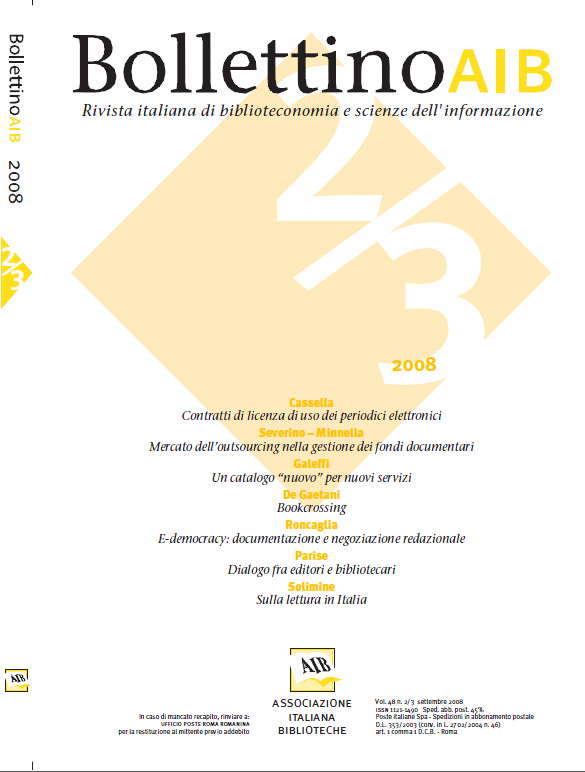Il Bookcrossing, moderno esempio di lettura nomadica: la necessità di farsi trovare dove la lettura transita
Contenuto principale dell'articolo
Abstract
The aim of this study is to create a work of description and analysis of the origin of the bookcrossing phenomenon and its national diffusion.
Bookcrossing is a new way for circulating books by freeing them in public places, with the hope that someone will find them and allow them to continue to travel.
In Italy, bookcrossing has by now become a daily occurrence for many people and has almost become a old phenomenon, even while continuing to be presented as something new. Bookcrossing is presented as "releasing" or even better "freeing" books anywhere and everywhere: on benches, among the branches of a tree, in the middle of the products on the shelves of a supermarket, on the seats of a bus, on trains, in bars, even in fountains, in the rucksack of an unaware friend or in the fridges on display in a furniture shop. The most important thing, which cannot be denied, is that the books have to be previously registered on a site and therefore made traceable through a unique code. It is important to use the right words: the books left around the city are in fact freed or released, never abandoned.
The idea at the basis of BC is that of not forcing culture to be immobile on the shelves of a library or in private bookshops, but to spread it and share it, all the better if casually.
The article intends analyzing the spread of the bookcrossing phenomenon in our country, the role assumed by the media in the spread of the phenomenon, the relationship with libraries, a critical comment of the phenomenon with respect to the five laws of librarianship written by S.R. Ranganathan.
The considerable attraction attributed to bookcrossing seems to be determined, in the first place, by the awareness that one of the main merits of this phenomenon lies in being a practical example of synergy between media that are different by nature: books and computer. Cooperation of two such different media, and the intention to make them complementary and functional for a common aim, is carried out in favour of the spread and sharing of the pleasure of reading, seen however as a collective and not an individual experience.
In bookcrossing the importance attributed to a book is as great as the intention to develop human relations and a need for socializing and the rediscovery of the pleasure of sharing culture.
It has also been asked if bookcrossing means a chance to read more and therefore an incentive to spreading reading: the information collected underlines that, if seen as a game, bookcrossing can potentially create curiosity in some apparently hostile readers, it can also reawaken a dormant passion and again it can enliven a situation that is in itself positive. The potential user basin for bookcrossing is very extensive inasmuch as anyone who has an Internet connection and knows a bit of English can live the experience.
Bookcrossing is a new way for circulating books by freeing them in public places, with the hope that someone will find them and allow them to continue to travel.
In Italy, bookcrossing has by now become a daily occurrence for many people and has almost become a old phenomenon, even while continuing to be presented as something new. Bookcrossing is presented as "releasing" or even better "freeing" books anywhere and everywhere: on benches, among the branches of a tree, in the middle of the products on the shelves of a supermarket, on the seats of a bus, on trains, in bars, even in fountains, in the rucksack of an unaware friend or in the fridges on display in a furniture shop. The most important thing, which cannot be denied, is that the books have to be previously registered on a site and therefore made traceable through a unique code. It is important to use the right words: the books left around the city are in fact freed or released, never abandoned.
The idea at the basis of BC is that of not forcing culture to be immobile on the shelves of a library or in private bookshops, but to spread it and share it, all the better if casually.
The article intends analyzing the spread of the bookcrossing phenomenon in our country, the role assumed by the media in the spread of the phenomenon, the relationship with libraries, a critical comment of the phenomenon with respect to the five laws of librarianship written by S.R. Ranganathan.
The considerable attraction attributed to bookcrossing seems to be determined, in the first place, by the awareness that one of the main merits of this phenomenon lies in being a practical example of synergy between media that are different by nature: books and computer. Cooperation of two such different media, and the intention to make them complementary and functional for a common aim, is carried out in favour of the spread and sharing of the pleasure of reading, seen however as a collective and not an individual experience.
In bookcrossing the importance attributed to a book is as great as the intention to develop human relations and a need for socializing and the rediscovery of the pleasure of sharing culture.
It has also been asked if bookcrossing means a chance to read more and therefore an incentive to spreading reading: the information collected underlines that, if seen as a game, bookcrossing can potentially create curiosity in some apparently hostile readers, it can also reawaken a dormant passion and again it can enliven a situation that is in itself positive. The potential user basin for bookcrossing is very extensive inasmuch as anyone who has an Internet connection and knows a bit of English can live the experience.
Dettagli dell'articolo
Fascicolo
Sezione
Articoli

Questo lavoro è fornito con la licenza Creative Commons Attribuzione - Condividi allo stesso modo 4.0.
